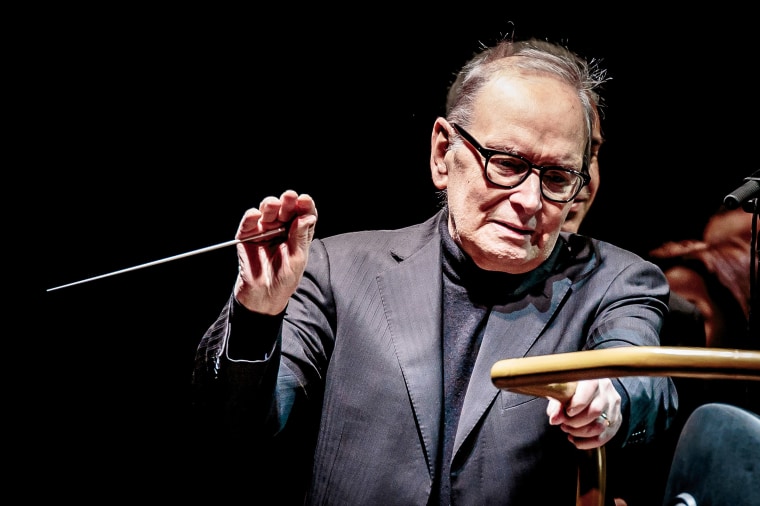ROME — Italian composer Ennio Morricone, who created the coyote-howl theme for the iconic Spaghetti Western “The Good, the Bad and the Ugly” and the soundtracks such classic Hollywood gangster movies as “The Untouchables,” has died. He was 91.
Morricone’s longtime lawyer, Giorgio Assumma, said the Maestro, as he was known, died early Monday in a Rome hospital of complications following a fall, in which he broke a leg.
During a career that spanned decades and earned him an Oscar for lifetime achievement in 2007, Morricone collaborated with some of Hollywood’s and Italy’s top directors, including on “The Untouchables” by Brian de Palma, “The Hateful Eight” by Quentin Tarantino and “The Battle of Algiers” by Gillo Pontecorvo.
The Tarantino film would win him the Oscar for best original score in 2016. In accepting that award, Morricone told the audience at the ceremony: “There is no great music without a great film that inspires it.”
In total, he produced more than 400 original scores for feature films.
His iconic so-called Spaghetti Western movies saw him work closely with the late Italian film director Sergio Leone.
Morricone was credited with nothing less than reinventing music for Western movies through his partnership with Leone, a former classmate. Their work together included the “Dollars” trilogy starring Clint Eastwood as a quick-shooting, lonesome gunman: “A Fistful of Dollars” in 1964, “For a Few Dollars More” in 1965 and “The Good, the Bad and the Ugly” a year later.
Morricone was celebrated for crafting just a few notes, like those played on a harmonica in Leone’s 1984 movie “Once Upon A Time in America,” which would instantly become the film’s motif.
“Inspiration does not exist,” Morricone said in a 2004 interview with The Associated Press. “What exists is an idea, a minimal idea that the composer develops at the desk, and that small idea becomes something important.”
In a later interview, with Italian state TV, Morricone cited “study, discipline and curiosity” as the keys to his creative genius. “Writing music, like all creative arts, comes from a long path” along life’s experiences, he said.
In his late 80s, Morricone provided the score for “The Hateful Eight,” Tarantino’s 2015 70-mm epic and the first time in decades that he had composed new music for a Western. It was also the first time Tarantino had used an original score.
In accepting Morricone’s Golden Globe for the music in his place, Tarantino called him his favorite composer.
“When I say ‘favorite composer,’ I don’t mean movie composer. ... I’m talking about Mozart, I’m talking about Beethoven, I’m talking about Schubert,” Tarantino said.
Italy’s head of state, President Sergio Mattarella, in a condolence message to the composer’s family, wrote: “Both a refined and popular musician, he left a deep footprint on the musical history of the second half of the 1900s.”
Morricone’s sound tracks, Mattarella said, “contributed greatly to spreading and reinforcing the prestige of Italy in the world.”
Morricone’s style was sparse, made of memorable tunes and unusual instruments and arrangements, and often stirred deep emotions. His music punctuated the long silences typical of the Spaghetti Westerns, with the characters locked in close-ups, staring at each other and waiting for their next moves. The coyote howl, harmonicas and eerie whistling of “The Good, the Bad and the Ugly” became Morricone’s trademark and one of the most easily recognizable soundtracks in cinema.
Minutes before handing Morricone the Oscar for lifetime achievement in 2007, Eastwood recalled hearing for the first time the score of “A Fistful of Dollars” and thinking: “What actor wouldn’t want to ride into town with that kind of music playing behind him?”
It was a night to remember for Morricone, who had been nominated for Oscars five times (“The Hateful Eight” was his sixth) but until then had never won.
Born in Rome on Nov. 10, 1928, Morricone was the oldest of the five children. His father was a trumpet player.
After studying trumpet and composition at the Conservatory of the Accademia Nazionale di Santa Cecilia in the Italian capital, he started working as a trumpeter and then as an arranger for record companies.
“I started working on very easy kinds of music pieces for the radio, for television and then for the theater, and then little by little I started to compose the film scores,” he told the AP in 2016.
In 1961 he wrote his first score for a movie, a bittersweet comedy set in the final moments of Fascism called “Il Federale” (known in English as “The Fascist”).
Asked by Italian state TV a few years ago if there was one director he would have liked to have worked with but didn’t, Morricone said Stanley Kubrick had asked him to work on “Clockwork Orange.” But that collaboration didn’t happen because of a commitment to Leone, Morricone recalled.
Morricone is survived by his wife Maria Travia, whom he cited when accepting his 2016 Oscar. Married in 1956, the couple had four children, Marco, Alessandra, Andrea and Giovanni.
